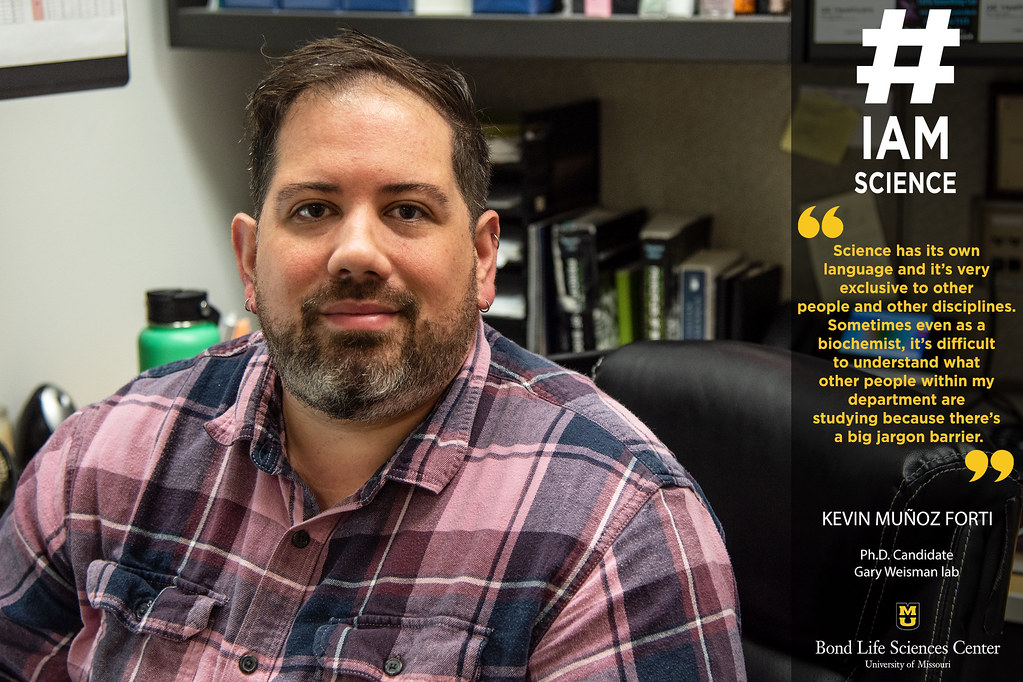Barriers in science can come in many different forms, whether it be through the force of a magnetic field, an experiment gone awry or communication between people.
Kevin Muñoz Forti makes it a part of his daily work to break down these issues and work towards solutions.
Muñoz Forti facilitates a system of communication and outreach in more ways than one through his work at Bond LSC as a Ph.D. candidate. He works in the Gary Weisman lab where he researches nucleotide receptors and how they change the inflammatory response of particular cells.
“I never wanted to study science. I wanted to study languages,” Muñoz Forti said. “I saw myself in a creepy old library, translating text for the history channel, but that’s not really a viable option for me socially and culturally, being from Puerto Rico and the expectations of my family who have all dedicated themselves to science or medicine.”
Each morning he comes to Bond LSC and starts his research for the day. He leaves things “cooking or brewing” while he is in class and comes back afterwards to check on the updated results of that day’s project. Some nights he might have responsibilities or meetings as a Graduate Professional Council Department representative — which he has been for the past four years — but most days it is class, research, repeat, which aligns his days in a rhythm of sorts.
“I choose not to balance my work but merge it, because I’m constantly doing something, so I can do everything I want to do but not have to specifically carve out time for each task,” Muñoz Forti said. “That’s something that’s unique about research that you can’t do that with a typical 9-5.”
Muñoz Forti discovered his affinity for translation when he studied biomedicine at the University of Puerto Rico-Ponce, and he pursued his master’s degree at Pontifical Catholic University of Puerto Rico in biotechnology. He chose a scientific path rather than one focused on languages, because he saw the opportunity for the two subjects to come together in a career of his own making.
For Muñoz Forti, research was something he stumbled upon and not exactly what he set out to do. Blending science and technology allowed Muñoz Forti to achieve a nuanced outlook on research projects that might otherwise be limited in perspective. When Muñoz Forti started undergraduate research with a professor studying the lipid profiles displayed in diabetic children, his work changed in a way that would go much further than just the field of immunology. As Muñoz Forti progressed in his career, he continued to decipher science throughout it all.
“Science has its own language and it’s very exclusive to other people and other disciplines,” Muñoz Forti said. “Sometimes even as a biochemist, it’s difficult to understand what other people within my department are studying because there’s a big jargon barrier.”
Muñoz Forti plans to break down this language wall between scientists and the public by contributing to websites like “Ask A Biologist.” This website — created by Arizona State University’s College of Liberal Arts and Science and Funded by the National Science Foundation — aims to use multimedia materials to convey and break down science-related topics. He writes and translates text pieces into Spanish for the website, aligning with his goal to support communication between seemingly different fields and give each scientist a unique voice in the process.
This element of transferring and applying information into various areas of study is a skill Muñoz Forti continues to improve upon over time, even applying it to his hobby of reading sci-fi novels.
“I enjoy not contradicting the information in books but seeing that something is really possible from the science perspective and that someone should actually do this in real life,” Muñoz Forti said.
Muñoz Forti discovered that in addition to “Ask A Biologist,” he truly found his love for science in teaching others. With his masters in biotechnology, Muñoz Forti is helping Dr. Shari Freyermuth to teach her course “Biotechnology in Society.” The course is specifically designed to teach the basics of biochemistry to non-biochemistry majors who are new to the field using his translation skills.
Muñoz Forti finds that consistency in both language and his daily routine are key to furthering communication among scientists and the communities they hope to reach.
Lost in the translation of it all, he works to combine immunology and biomedicine daily through research and teaching. These tasks propel Muñoz Forti into action each day and help him connect society to science in order to create an increased understanding of how the two intersect.
As Muñoz Forti continues to pursue his goals and advance his career as a scientist, he will merge the two in his new venture. Joining an NIH K12 post-doctoral training program, he will conduct his post-doctoral research at the University of Chicago while teaching at Northeastern Illinois University. Contributing to research at a world renown university and teaching at a Hispanic-serving institution will create a platform for Muñoz Forti to further break down the barriers in science communication.


